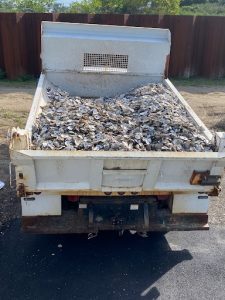
Article by Connecticut Sea Grant
Empty oyster and clam shells from Long Island Sound shouldn’t be treated like trash.
They are vital components of healthy habitat for shellfish and other marine life, and need to be returned to their watery home instead of being hauled away with other garbage. That’s the message shell recycling advocates are advancing as part of a new statewide initiative.
“Virtually all the shell that goes to restaurants and markets is being discarded,” said Tessa Getchis, aquaculture extension specialist for CT Sea Grant and UConn Extension. “Connecticut is in the rare position of having some of the few self-sustaining populations of oyster beds in the world. We need to get that shell back in the water so that healthy beds remain productive, and so we can rebuild those in suboptimal condition.”
At 7:30 p.m. on April 4, Getchis will give a presentation on the history of the Connecticut oyster beds and the state’s efforts to restore this critical habitat, and UConn Marine Sciences Professor Zofia Baumann will follow with an overview of her efforts to develop a shell recycling program in the town of Groton. The shell recycling initiative is being launched as part of a broader effort to restore the state’s natural shellfish beds to preserve and enhance their vital economic, environmental and cultural contributions.
The program at the UConn Avery Point campus, titled, “Ensuring the Future Viability of Connecticut’s Natural Oyster Beds,” is part of the annual Coastal Perspectives public lecture series held in the campus auditorium. Admission is free, and the program can also be accessed virtually.